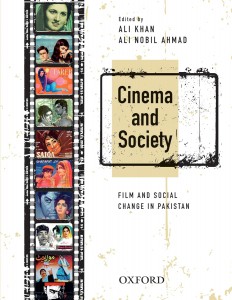Cinema and Society
Film and Social Change in Pakistan
Edited by Ali Khan and Ali Nobil Ahmed


Average rating: ![]()
| 0 | rating | |
| 0 | rating | |
| 0 | rating | |
| 0 | rating |
Your rating: -
Book Presentation:
The book presents a rich collection of critical essays, ethnographic writings, memoirs, and reflections, portraying a well-rounded picture of cinema culture and historical change in Pakistan. The multiplicity of voices and approaches enhances the appeal of this collection, which is the first ever to delineate the diversity in the cinematic and extra-cinematic traditions of Pakistan, as well as in the histories of production, exhibition, and reception. The work also highlights aesthetic and affective politics in relation to nationalism; Islamization in policy and practice; the biopolitics of morality, ethnicity, gender, and sexuality; and the phenomenology of film exhibition and urban formation. The book incorporates rarely seen nostalgia items, such as pictures of studio shootings, as well as of film actors, film scenes, posters, and lobby cards.
About the authors:
Ali Khan is Associate Professor of Anthropology and Department Chair at the Department of Humanities and Social Sciences at Lahore University of Management Sciences. His research interests vary from labor issues, particularly child and bonded labor to popular culture in Pakistan, focusing particularly on cinema and sports. He has previously worked in Washington and in Islamabad for the World Bank's South Asia Region and with the International Labor Organization primarily on projects related to child and bonded labour. Khan's book Representing Children: Power, Policy and the Discourse on Child Labour in the Football Manufacturing Industry of Pakistan was published in 2007 by Oxford University Press. He is also the General Editor for a series of books on sociology and anthropology in Pakistan.Ali Nobil Ahmad is a Researcher at the Zentrum Moderner Orient, Berlin, and Assistant Professor in the Department of Humanities and Social Sciences, Lahore University of Management Sciences, where he teaches and designs courses in modern history, historiography, and world history. He was formerly a full-time Research Officer on the Leverhulme Project on Migration and Citizenship, undertaken by the Department of Geography at the University College, London, where he worked full-time on a global study on human smuggling and trafficking. He is also on the editorial board of an art and cultural studies journal titled, Third Text, and regularly contributes to various academic journals.
See the publisher website: Oxford University Press
> From the same authors:
Film and Cinephilia in Pakistan (2020)
Beyond Life and Death
Dir. Ali Nobil Ahmad and Ali Khan
Subject: Countries > South Asia
> On a related topic:
Thinking Past ‘Post-9/11' (2023)
Home, Nation and Transnational Desires in Pakistani English Novels and Hindi Films
by Jayana Jain
Subject: Countries > South Asia
Love, War, and Other Longings (2020)
Essays on Cinema in Pakistan
by Vazira Fazila-Yacoobali Zamindar and Asad Ali
Subject: Countries > South Asia
South Asian Filmscapes (2020)
Transregional Encounters
Dir. Elora Halim Chowdhury and Esha Niyogi De
Subject: Countries > South Asia
Crossover Stars in the Hindi Film Industry (2020)
Globalizing Pakistani Identity
by Dina Khdair
Subject: Countries > South Asia
Filming the Line of Control (2019)
The Indo–Pak Relationship through the Cinematic Lens
Dir. Meenakshi Bharat and Nirmal Kumar
Subject: Countries > South Asia
The Indian Partition in Literature and Films (2019)
History, Politics, and Aesthetics
Dir. Rini Bhattacharya Mehta and Debali Mookerjea-Leonard
Subject: Countries > South Asia
Activist Documentary Film in Pakistan (2018)
The Emergence of a Cinema of Accountability
by Rahat Imran
Subject: Countries > South Asia
Women's Transborder Cinema (2024)
Authorship, Stardom and Filmic Labor in South Asia
Subject: Countries > South Asia